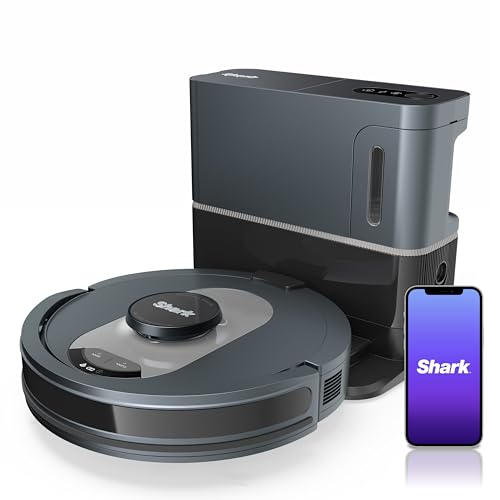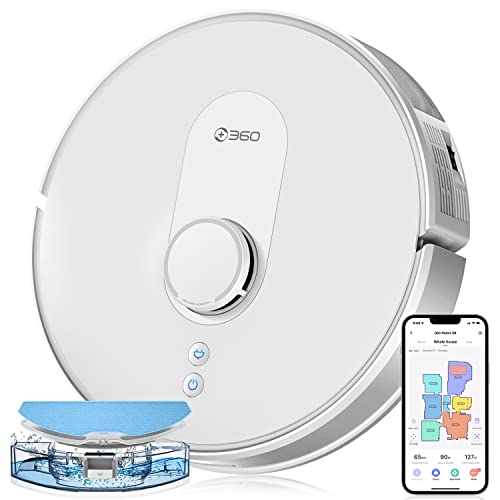15 Trends That Are Coming Up About Robot Vacuum
페이지 정보

본문
 How to Find the best rated robot vacuum and mop Robot Vacuum
How to Find the best rated robot vacuum and mop Robot VacuumIf you're able to live without smart capabilities like mapping, and don't mind emptying the dustbin every 60 days or so, a basic robotic vacuum will probably work for you. Look for a model with a clean base and is compatible with voice assistants.
It excels at picking up dirt, pet hair and cat litter on tile floors, hardwood floors and carpeting that is lower-pile better than any other robo vacuum we've tried. It also maps and set virtual no-go zones for rooms and areas.
1. Powerful Suction
A robot vacuum will assist you in keeping up with the dust, pet fur and dander that collects on your floors every day. It also can reduce the frequency of deep cleaning, which will save you time and effort. The most effective models have powerful suction that is able to tackle most messes and leave your home sparkling clean.
Selecting a vacuum that is also able to mop will allow you to get more space using one machine, which can be particularly beneficial in larger homes. You can find a model that has a water tank integrated into the chassis or as an extra piece that you can remove after vacuuming. You'll have to empty it and refill it, however it's an additional task that requires some extra effort on your part.
In a perfect world it would be ideal to clean your floors before you use your robot vacuum, preventing it from hitting anything. But in most homes, this isn't possible or desirable. The majority of models let you make use of an app for your smartphone to build virtual barriers that the robot can observe. Some have no-go zones which you can use to flag areas you don't want it to be in, like kids' rooms or a pile of cords for your device in the corner.
If you're looking for a basic robot vacuum without all the bells and bells, this model from the company that makes networking TP-Link is a great choice. It is quiet, can be used on hard floors as well as low-pile carpets and can be programmed using the app to vacuum and mop at your convenience. It's got a long battery life of around 180 minutes.
2. Easy to Operate
In general, robot vacuums require very little input from you. They make use of instruments for navigation, such as sensors cameras, lasers, and sensors to move around and collect dust, pet hair, and food crumbs from hard floors, tiles and hardwood. Many have boundary strips that aid in staying within a room's walls, while pricier models can be set to automatically wake up and start cleaning at a predetermined time. Certain models come with fall detection technology to help them avoid falling down a flight of stairs or getting caught in cords.
If you want to control your robot vacuum from the comfort of a couch, you should look for models that can work with voice assistants such as Alexa and Google Assistant. Also, look for models that connect to Wi-Fi and allow you to start cleaning sessions from anywhere via an app. You may want to select an option with a long-lasting battery, as well as a large dustbin, depending on the size of your home.
Some robot vacuums double as mops, utilizing reservoirs of water to wash your floor. This is useful for regular mopping but won't work for tough messes like pet poop or other spills that get wet. You can select hybrids with a removable microfiber mopping pad or a self-emptying option that lets you go for up to 60 days without emptying the base.
3. Smart Mapping
Certain robots utilize advanced mapping technology to build a detailed map while they clean. This makes it easier to avoid crashing into furniture and getting caught on cords or chairs. This feature is usually only available on higher-end models, but it's certainly one of the best self-emptying robot vacuum and mop ways to make sure your robot has a full understanding of the layout of your home and knows where to go next when it runs out of battery.
Most robots let you create virtual barriers. This can be done through an application or even physical boundary strips. This lets you block off zones that you don't want your robot venture into, so it can concentrate its attention on areas and rooms that require the most attention.
Many robots will also automatically change floors depending on the kind of floor they are cleaning. This can be achieved by switching from carpet to hard flooring or by focusing on particular areas of your home, such as corners and baseboards. This feature proved to be helpful in our tests and improved the vacuum's performance on both hardwood flooring and carpet flooring with low pile. It is essential to put away any furniture or cords that are loose prior to using your robot vacuum to ensure that it doesn't get caught.
4. Remote Control
The majority of robot vacuums are WiFi-enabled and work with Amazon Alexa, Google Assistant and Siri Shortcuts, which allow users to control them with voice commands or from your smartphone. Many connect to smart home systems that create a map of your space after each cleaning session to "learn" your layout and plan more efficient routes for future runs. Some have obstacles avoidance built-in that prevents them from damaging furniture and getting stuck on things like loose charging cables or pet hair.
Most robots come with a remote you can use to pilot them around your home. The majority of robots can be controlled by a mobile app, which offers more features. You can create multiple cleaning schedules and create an inventory of your preferred rooms. You can also manually guide the robot using direction the arrows.
Certain models have no-go zones, which are virtual barriers you can configure in the app to block the robot from entering certain areas (like toys for children or dog bowls and beds). Certain apps let you create a map of your house and provide detailed information on the floors. The app that we recommend as our top choice, the Roborock S7+, has many useful options to help you clean your house, but its interface isn't as polished as those from iRobot and Shark.
5. Long Battery Life
Robot vacs that can work throughout the house without stopping to recharge or empty their trash bins make it easier for you to save time and effort. Some robot vacuums are compatible with smart home platforms like Alexa, Google Assistant, and Siri Shortcuts to allow hands-free operation. They can also make an image of your space, allowing you to program them to clean specific areas or rooms, and to beware of obstacles.
The majority of robot vacuums detect objects, but the iRobot J7 has advanced features like "home mapping" and obstacle avoidance. These can make your life much easier (although one of our test robots did "eat" a few socks). If you're looking to push your home cleaning to the next level opt for a robotic mop that has a water tank that can be filled and then empty.
While none of the models that we tested could match the ability to pick up dirt of a stand-up vacuum they did a great job of cleaning hard floors and low pile carpets. They excel at sweeping up fine dust and food dust, tracked-in dirt, and pet hair. They are also able to handle metal screws and nuts and the stray cat litter. The best robot vacuums are able to clean edges and corners and work around furniture. Eufy 11S is a relatively affordable and basic model.
6. Convenient Self-Charging
A robot vacuum will help keep your home tidy and clean without doing lots of work. You can schedule cleanings in the app and create no-go zones to ensure that your robot doesn't damage your plants or ruin your favorite chair. The majority of our top picks also automatically empty their bins and clean their docking stations for you.
The best robot vacuums are programmable to clean your floors regularly for weeks or months at a time, thereby making it easier to save time and effort of manually mopping or sweeping your floors every week or day. This lets you enjoy more time doing things you like and reduces the time needed to clean your floors manually.
In the course of testing the Q Revo was able to grab small particles such as oatmeal and baking soda, heavier debris such as nails and screws made of steel and even fluffy matter like hair from pets. It does not have the intelligent mapping and object-avoiding features found in our top picks, but is still a great option for most families.
The best thing about the j7 is that it makes use of cameras and processor-powered smarts to recognize and avoid obstacles such as power cords, shoes, socks, and pet waste. This means that you don't need to clean up after using your robot. However, rooms that are cluttered may cause your bot to get stuck and do poorly.

- 이전글4 Dirty Little Tips About Local Auto Locksmith And The Local Auto Locksmith Industry 24.06.07
- 다음글20 Quotes That Will Help You Understand Pushchair 2 In 1 24.06.07
댓글목록
등록된 댓글이 없습니다.
